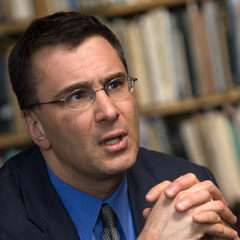On Second Occasion, Obamacare Architect Jonathan Gruber Says States That Don't Set Up Exchanges Lose Access to Obamacare Subsidies

Last night, a video surfaced showing Massachusetts Institute of Technology economist Jonathan Gruber saying in January 2012 that if states do not set up their own exchanges under Obamacare, they lose access to the law.
The clip was important because Gruber is an influential health policy analyst who helped author parts of Obamacare and consulted with multiple states on the implementation of health insurance exchanges under the law.
The statement he made in the video, that "if you're a state and you don't set up an exchange, that means your citizens don't get their tax credits, aligned closely with the plain language of the law, which plainly states that subsidies are only available state-established exchanges, as well as the argument made by legal challengers who have argued in court that the Obama administration's implementation of the law—which allowed subsidies in federally run exchanges via an Internal Revenue Service rule—is illegal.
The timing was also notable. Gruber made the statement in January 2012, before the paper laying out the legal case against the administration's implementation had been published, and before the legal challenge against it had been filed.
Gruber has over the past year and a half repeatedly taken the other side of the argument, saying on MSNBC this week, "It is unambiguous this is a typo. Literally every single person involved in the crafting of this law has said that it's a typo, that they had no intention of excluding the federal states."
This morning, in response to the clip, Gruber told The New Republic that the comment was a mistake. "I honestly don't remember why I said that. I was speaking off-the-cuff. It was just a mistake," he said.
He continued: "There was never any intention to literally withhold money, to withhold tax credits, from the states that didn't take that step" [of creating their own exchanges]. That's clear in the intent of the law and if you talk to anybody who worked on the law. My subsequent statement was just a speak-o—you know, like a typo."
But as it turns out, earlier in the same month as the original clip, he made essentially the same point, using similar language, once again calling the possibility that states won't set up their own exchanges a "threat" to the law and saying explicitly that residents in states that don't set up their own exchanges would not have access to tax credits.
In a January 10, 2012, speech to the Jewish Community Center of San Francisco, he said the following:
The third risk, and the one folks aren't talking about, which may be most important of all, is the role of the states. Through a political compromise, it was decided that states should play a critical role in running these health insurance exchanges. And health insurance exchanges are the centerpiece of this reform, because they are the place that individuals can go to shop for their new, securely priced health insurance. But if they are not set up in a way which is transparent, and which is convenient for shoppers, and which allow people to take their tax credits and use them effectively by health insurance, it will undercut the whole purpose of the bill.
Now a number of states have expressed no interest in doing so. A number of states—like California, has been a real leader—one of, I think it was the first state to pass an exchange bill. It's been a leader in setting up its exchange. It's a great example. But California is rare. Only about 10 states have really moved forward aggressively on setting up their exchanges. A number of states have even turned down millions of dollars in federal government grants as a statement of some sort—they don't support health care reform.
Now, I guess I'm enough of a believer in democracy to think that when the voters in states see that by not setting up an exchange the politicians of a state are costing state residents hundreds and millions and billions of dollars, that they'll eventually throw the guys out. But I don't know that for sure. And that is really the ultimate threat, is, will people understand that, gee, if your governor doesn't set up an exchange, you're losing hundreds of millions of dollars of tax credits to be delivered to your citizens. [emphasis added]
Gruber reiterates in the speech that he "helped the Obama administration" craft the legislation.
If this is another mistake, it is an awfully strange one that just happens to match not only the statement he made a week later, but also the plain language of the health law and the argument advanced by legal challengers to the IRS rule allowing subsidies within Obamacare's federal exchanges.
Update: Gruber says that these remarks were also mistakes. MSNBC's Adam Serwer contacted him about the second clip:
Gruber told The New Republic that he had made a mistake.
"I was speaking off-the-cuff. It was just a mistake. People make mistakes. Congress made a mistake drafting the law and I made a mistake talking about it," Gruber told The New Republic's Jonathan Cohn. "But there was never any intention to literally withhold money, to withhold tax credits, from the states that didn't take that step. That's clear in the intent of the law and if you talk to anybody who worked on the law. My subsequent statement was just a speak-o—you know, like a typo."
A second recording has surfaced showing Gruber making similar statements about subsidies not being available on federally run exchanges. Asked over email whether those remarks were a mistake, too, Gruber wrote back, "same answer."
Listen to the clip, via John Sexton at Breitbart:
A recording of Gruber's complete January 10, 2012, remarks to the Jewish Community Center of San Francisco is available here.
(This post has been updated for clarity and to add some information.)


Show Comments (170)